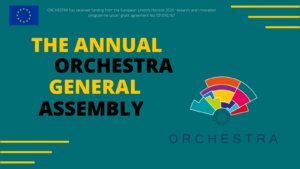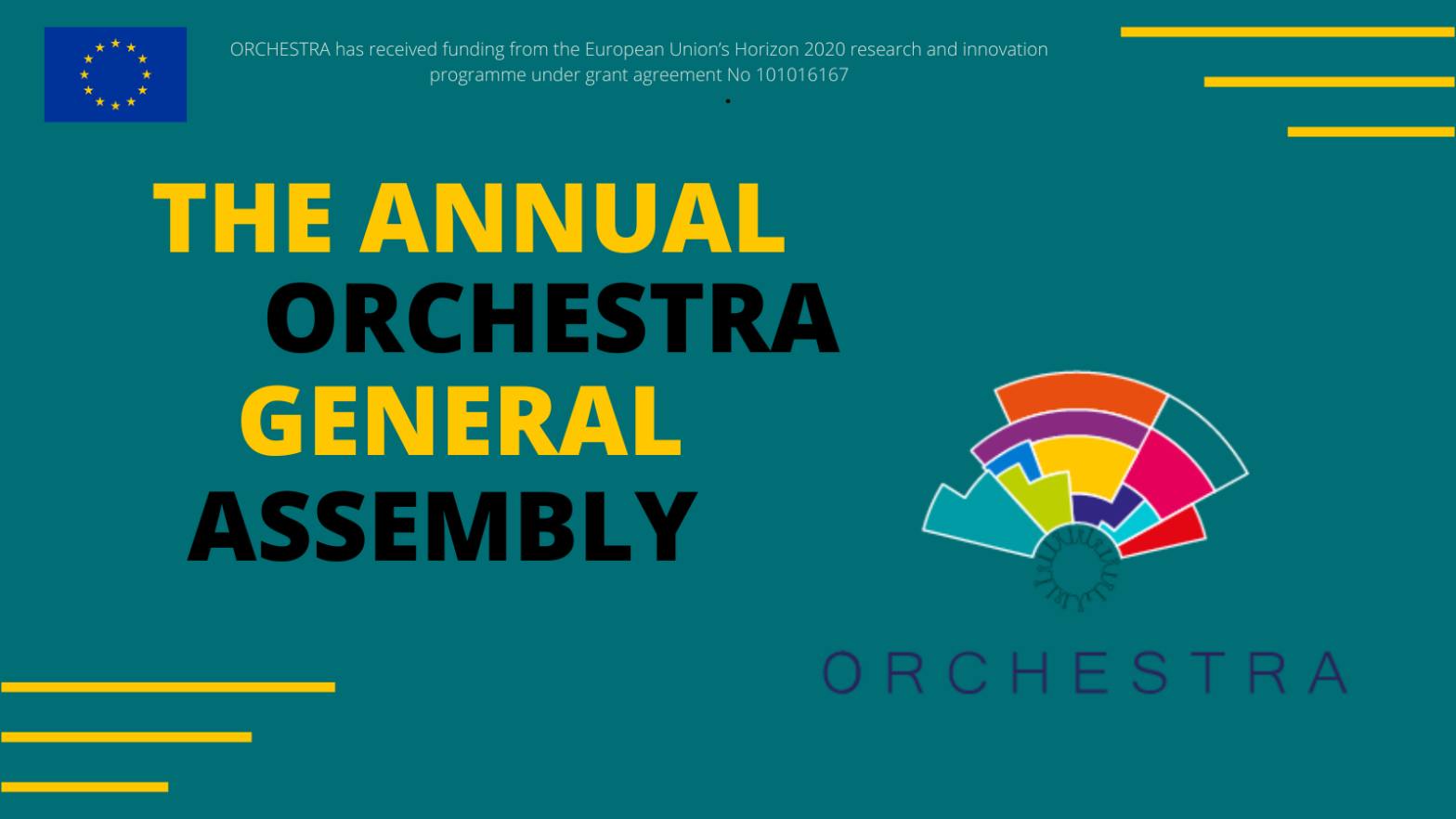The Annual General Assembly

The Annual General Assembly
The ORCHESTRA General Assembly took place on 9 May. The work package leaders presented and discussed work in progress, achievements and further steps. Over 80 members of the ORCHESTRA Consortium Partners joined the Assembly, as well as representatives from the project’s Stakeholders, the Advisory Panel, and the Ethics Board, who actively participated by sharing their valuable feedback and suggestions.
The project’s coordinator, Prof. Evelina Tacconelli gave an overview of the course and the results of the project. An important topic was the submission, of a no-cost project extension. Due to the development of post and long COVID conditions an extended research is necessary. The diversity of ORCHESTRA’s cohorts has the potential to provide important pieces of the puzzle to understand the long-term consequences of COVID-19. Almost all partners agreed to prolong their work. Additonal good news was the number and quality of research papers.
Professor Tacconelli, also leader of Work Package 2 presented progress in the Development of predictive models to inform therapeutic algorithms and in modelling patients’ trajectories of clinical and biological features from the acute phase.
Prof. Laurence Meyer, INSERM, and Prof. Michael Hölscher, LMU Munich, presented Work Package 3 updates. One important task of WP3 – in collaboration with WP8 – is the intrahousehold transmission of COVID-19. The paper on this topic has been accepted and results will be published soon. Waning antibodies in the general population is another focus of WP3. The understanding is particularly interesting to answer the question on how to better protect the population. The manuscript of the paper is in progress. WP3 also researches several Long COVID related topics. Amongst them are neurological and psychological consequences of the disease, as well as identifying changes in DNA after COVID-19 infection in the general population.
Prof. Maddalena Giannella, University of Bologna, leader of Work Package 4, reported on the progress of research questions around the fragile population (e.g. Solid Organ Transplant recipients, SOT, pregnant woman and children, PARKINSON and HIV patients). The long-term risks of COVID-19 are also an important research topic in WP4. Prevalence, risk factors and therapeutic management of persisting COVID-19 in fragile patients is a new task of WP4. The prospective multicentre cohort of fragile patients also contributes to predict antibody response to SARS-CoV-2 vaccination in Solid Organ Transplant Recipients, and to shed light on the long-term immune response to booster dosages of COVID-19 vaccination in the fragile population. ORCHESTRA partner PENTA contributes with pregnancy and paediatric cohorts.
Prof. Paolo Boffetta, University of Bologna, leader of Work Package 5 presented about an analysis of psychological consequences of COVID-19 in healthcare workers was performed by Spanish, Romanian and Slovakian cohorts. A collaboration with VACCELERATE has been established to find out about vaccination efficacy. Furthermore, WP5 investigates in cell-mediated immunity, analysis of risks of breakthrough infections, analysis of long-term effects of COVID-19 in healthcare workers and in serological results after vaccination.
Work Package 6, led by Prof. Surbhi Malhotra-Kumar, University of Antwerp, discussed the broad tasks around serological analysis. The characterization of SARS-CoV-2 viral variants, cellular immunity for SARS-CoV-2 infection and of serological markers of SARS-CoV-2 infection are amongst the main foci of WP6. Furthermore, the work package achieved ground-breaking insights on the development of spike mutations in patients receiving treatments with monoclonal antibodies.
Thomas Osmo, CINES, Eugenia Rinaldi, Charité, Hamam Abu Attieh, Charité, Miroslav Puskaric, HLRS, and Chiara Dellacasa, CINECA, presented the Work of Work Package 7. One major task is the Data Management Plan, which has been submitted. It supports the data management life cycle for all data that will be collected, processed or generated by the project. WP7 is continuously working on data harmonisation assessment and standardisation, on identifying and defining common data standards to improve health data interoperability and to enable data processing across cohorts and institutions. In addition to several other tasks, WP7 presented on the implementation of the National Hubs and the ORCHESTRA data portal.
Dr. Elisa Sicuri, IS Global and Prof. Jan Hasenauer, LMU München, showed the achievements of WP8 in the analysis of datasets on breakthrough infections, datasets from fragile populations, and datasets from long-term sequelae. Furthermore, the team presented about research on determinants of individual preventive health behaviour. The translation of strategies recommended in Low and Middle Income Countries includes so far twelve countries are participating: Argentina, Brazil, Venezuela, Guyana, Tunisia, Ethiopia, Sudan, Afghanistan, Republic of Congo, Gabon, Mozambique and India.
Work Package 9’s major achievements were presented by Dr. Daniele Pantano. WP9 created some significant collaborations. The European Safety Foundation & and Long COVID EU represent patient advocacy. WP9 initiated the COVID-19 Global Guidance Group (CGGG). The CGGG is a board of external experts who assess the ORCHESTRA publications. The project is also looking forward to the upcoming collaboration with Zadig, a professional journalistic and editorial agency.
Work Package 10, led by Prof. Janne Vehreschild, UHC, discussed further dissemination activities and presented the upcoming science challenge.
###
